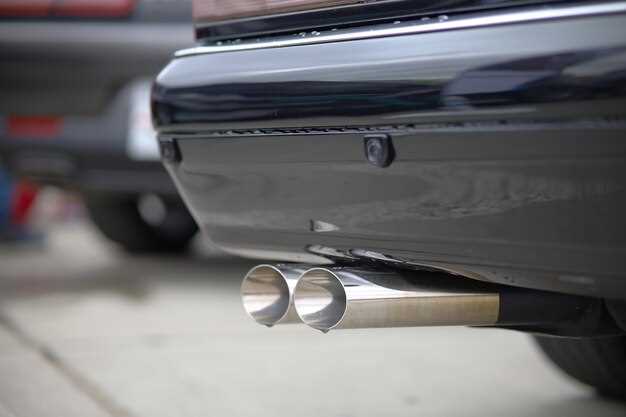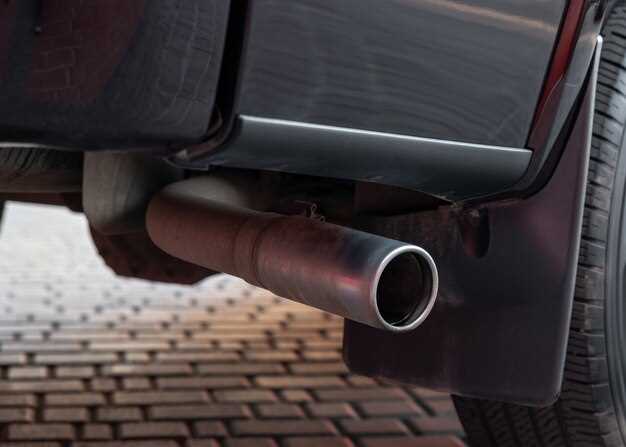
For Jeep enthusiasts and performance seekers, upgrading the exhaust system is one of the most effective ways to enhance both power and sound. Aftermarket exhaust parts can significantly improve the overall performance of Jeep models, providing increased horsepower and torque, while also delivering a more aggressive engine note that complements the rugged aesthetic of these vehicles. When considering an upgrade, it’s essential to choose the right exhaust system that aligns with your specific model and performance goals.
Whether you own a Wrangler, Cherokee, or Gladiator, there are numerous aftermarket options available that promise to boost your Jeep’s capabilities on and off the road. It’s important to understand that not all exhaust systems are created equal; factors such as material quality, design efficiency, and compatibility with your Jeep’s engine make a significant difference in performance outcomes. Many brands have earned a reputation for delivering reliable, high-quality exhaust solutions tailored for the unique challenges faced by Jeep owners.
Moreover, the right aftermarket exhaust can achieve a balance of performance enhancement and durability, ensuring that you enjoy the benefits of your investment for years to come. From cat-back systems that improve exhaust flow to header upgrades that enhance horsepower, exploring the top aftermarket exhaust options available for Jeep models will equip you with the knowledge needed to make an informed decision. This article will guide you through some of the best exhaust systems on the market today, helping you elevate your Jeep’s performance to new heights.
Choosing the Right Exhaust for Your Jeep Model

Selecting the appropriate exhaust system for your Jeep is essential to enhance performance, improve sound, and increase overall driving enjoyment. Here are key factors to consider when choosing the right exhaust for your specific Jeep model:
- Compatibility: Ensure that the exhaust parts you select are specifically designed for your Jeep model. Different models may have unique mounting points and dimensions.
- Material: Choose between stainless steel, aluminized steel, or other materials. Stainless steel offers superior durability and resistance to corrosion, while aluminized steel is more economical but less resistant to the elements.
- Sound Level: Depending on your preference, exhaust systems come in various sound levels. Consider whether you want a subtle tone or a louder, more aggressive sound when accelerating.
- Performance Upgrade: Some exhaust systems are designed to increase horsepower and torque. Look for models that provide better airflow to optimize engine performance.
- Installation Ease: Assess if the exhaust system requires extensive modifications for installation. Bolt-on systems generally offer easier installation compared to those requiring welding.
- Brand Reputation: Research and choose reputable brands known for high-quality exhaust parts. Customer reviews and recommendations can guide you toward reliable options.
By considering these aspects, you can select an exhaust system that enhances your Jeep’s performance, sound, and overall driving experience. Always consult with professionals if you’re uncertain about the best choice for your specific model.
Sound Differences: What to Expect from Various Exhaust Systems
When upgrading the exhaust system on your Jeep, it’s crucial to understand the sound profile that different aftermarket parts can produce. Each exhaust system offers unique acoustic characteristics that can significantly alter your driving experience.
Starting with the standard factory exhaust, sound levels are generally subdued, providing a quiet ride suitable for everyday driving. However, most enthusiasts seek a more aggressive tone. Performance exhaust systems are designed to enhance sound while improving engine efficiency.
Aftermarket systems typically fall into a few categories. For instance, cat-back exhausts replace the system from the catalytic converter back, dramatically changing exhaust flow and pitch. Expect a deep, rich rumble that is more pronounced at lower RPMs, enhancing the presence of your Jeep on and off the road.
Another option is header systems, which can provide a more raspy or higher-pitched sound. This type of setup is often favored by those looking for a sportier appeal, especially in racing applications. As exhaust gases exit more freely, you may also notice a sharper throttle response.
If you are considering a muffler upgrade, the choice between performance and sound is key. Performance mufflers often produce a loud, aggressive growl, while those designed for a milder experience may retain more of the factory sound quality but with a slight performance bump. Brands like Flowmaster and Borla offer various configurations, each with distinct sound properties.
Additionally, the material of the exhaust parts can influence sound. Stainless steel systems tend to produce a cleaner, more polished sound, while aluminized steel can produce a slightly harsh tone over time.
In conclusion, when selecting an aftermarket exhaust system for your Jeep, consider the sound differences based on the type of system, materials used, and intended driving style. Ultimately, the right system not only enhances your vehicle’s performance but also delivers the sound that matches your passion for off-road adventures.
Material Comparisons: Stainless Steel vs. Aluminized Steel
When choosing aftermarket exhaust parts for your Jeep, understanding the differences between stainless steel and aluminized steel is crucial for performance and durability.
Stainless steel is renowned for its corrosion resistance, making it an ideal choice for off-road applications where exposure to moisture and harsh conditions is common. This material has a higher resistance to rust and can withstand extreme temperatures, ensuring a longer lifespan for exhaust systems. Additionally, stainless steel maintains its appearance over time, offering a polished look that many Jeep enthusiasts appreciate.
On the other hand, aluminized steel is a more budget-friendly option. It consists of a carbon steel base coated with aluminum, providing a moderate level of corrosion resistance. While aluminized steel can perform well in less demanding environments, it is more prone to rust if the coating is damaged or if subjected to excessive moisture. As a result, this material may require more frequent replacement compared to stainless steel.
In terms of weight, aluminized steel is lighter than stainless steel, which may slightly impact overall performance and fuel efficiency. However, Jeep owners who prioritize durability and longevity often favor stainless steel exhausts, despite the higher initial investment. Ultimately, the choice between stainless steel and aluminized steel exhaust parts will depend on your specific needs, budget, and the driving conditions your Jeep will encounter.
Installation Guidelines for Aftermarket Exhausts on Jeep Vehicles

Installing an aftermarket exhaust system on your Jeep can significantly enhance its performance and sound. However, to achieve the best results, it’s vital to follow proper installation procedures. Below are essential guidelines to ensure a successful installation.
-
Gather Necessary Tools and Materials
- Socket set
- Wrenches
- Jack and jack stands
- Exhaust hangers (if not included)
- Pipe cutter (if necessary)
- Safety gloves and goggles
-
Prepare the Vehicle
- Park the Jeep on a level surface.
- Engage the parking brake for safety.
- Disconnect the battery to prevent any electrical issues.
-
Remove the Factory Exhaust
- Locate the mounting points of the factory exhaust system.
- Using a socket or wrench, remove the bolts and clamps holding the exhaust in place.
- Cut the exhaust if it is welded to the headers or catalytic converter.
- Carefully remove the old exhaust components from the vehicle.
-
Install the Aftermarket Exhaust
- Begin installation at the header or catalytic converter.
- Align the new exhaust pipes with existing hangers and connections.
- Secure the components using bolts, clamps, or welding as required by the specific exhaust.
- Ensure proper fitment and clearance by adjusting the position of the exhaust.
-
Check for Leaks and Adjustments
- Reconnect the battery once the installation is completed.
- Start the engine and let it run for a few minutes.
- Inspect all joints and connection points for any exhaust leaks.
- Make necessary adjustments to hanger positions to prevent rattling.
By following these guidelines, you can ensure a seamless installation of your aftermarket exhaust system. This upgrade not only boosts the performance of your Jeep but also enhances its overall aesthetics and sound. Always refer to manufacturer instructions specific to your exhaust model for best results.
Performance Gains: Understanding Horsepower and Torque Improvements
When it comes to enhancing the capabilities of your Jeep, aftermarket exhaust systems play a crucial role in optimizing performance. These exhaust systems are designed to improve engine efficiency, thereby increasing horsepower and torque. Horsepower is the measurement of an engine’s ability to perform work over time, while torque refers to the rotational force produced by the engine. Both metrics are essential for driving dynamics and overall vehicle performance.
Aftermarket exhausts significantly reduce back pressure by improving the flow of exhaust gases. This allows the engine to breathe more freely, resulting in better combustion and increased power output. By replacing restrictive factory exhaust systems with performance options, Jeep owners can experience considerable gains in both horsepower and torque. Performance exhausts often incorporate wider pipes and high-flow mufflers, which facilitate a more efficient escape of exhaust gases.
Additionally, the tuning of exhaust systems can be tailored to optimize the performance characteristics of different Jeep models. Whether it’s for a Wrangler, Cherokee, or Gladiator, choosing the right exhaust can lead to improved throttle response, enhanced acceleration, and overall driving enjoyment. This not only enhances the vehicle’s performance on-road but also proves beneficial during off-roading adventures, where torque is crucial for climbing and maneuvering over rugged terrain.
In summary, investing in a quality aftermarket exhaust system for your Jeep can yield significant performance gains. By understanding how horsepower and torque improvements work in concert with a well-designed exhaust, Jeep enthusiasts can tailor their vehicles for optimal performance, making each drive an exhilarating experience.
Top Recommended Brands and Models for Jeep Aftermarket Exhausts
When searching for aftermarket exhausts for Jeep models, selecting the right brand and model is crucial for enhancing performance and maximizing the efficiency of your vehicle. Here are some of the top recommended brands that specialize in high-quality exhaust parts, offering remarkable upgrades for your Jeep.
| Brand | Model | Features |
|---|---|---|
| AFE Power | Mach Force-Xp | Mandrel-bent tubing, superior flow, available in various finishes, increased horsepower and torque. |
| MagnaFlow | Street Series | Performance efficiency, deep tone sound, durable construction, bolt-on design for ease of installation. |
| Borla | Stainless Steel Cat-Back | Quality stainless steel, aggressive sound, improved exhaust flow, perfect fitment for various Jeep models. |
| Flowmaster | American Thunder | Moderate sound level, sleek design, enhances performance, easy installation. |
| Gibson Exhaust | Dual Exhaust System | Powerful sound, improved torque, high-quality material, designed for off-road performance. |
Choosing the right aftermarket exhaust enhances your Jeep’s performance and provides a satisfying driving experience. Evaluate each brand based on sound preference, performance gains, and installation requirements to find the perfect fit for your vehicle.





